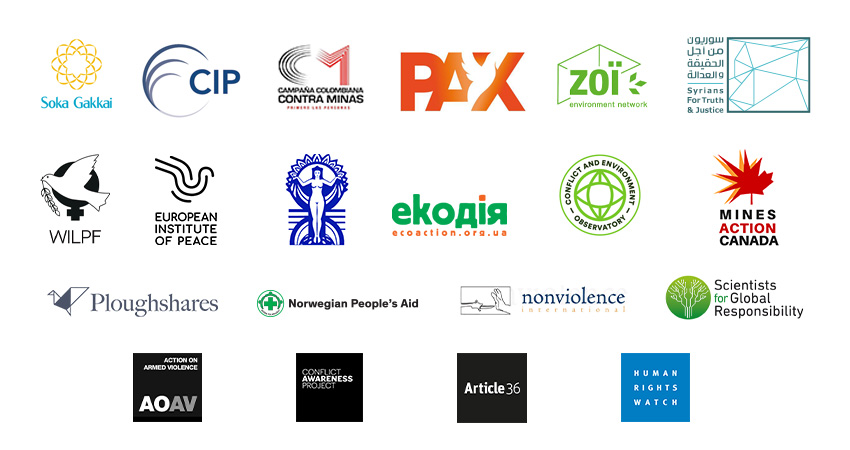2023 UN General Assembly First Committee – Civil Society Segment
Delivered by Ms. Brittany Roser (PAX) on behalf of 22 organizations
Honorable Chair, distinguished delegates,
In 2023, conflict-linked environmental degradation continued to exacerbate the world’s humanitarian, economic, and security crises. Yet the environmental dimensions of conflicts and military activities remain insufficiently addressed by the international peace and security establishment.
Take Russia’s invasion of Ukraine. Hundreds of hazardous facilities have been damaged; many towns and cities have suffered extensive destruction; and a third of Ukraine’s territory has been contaminated by land mines and unexploded ordnance, creating acute and long-term risks to human health and the environment. Meanwhile, the destruction of the Kakhovka dam caused massive ecosystem disruption, undermined Ukraine’s agricultural potential with its impacts on global food security, and threatened operations at Europe’s largest nuclear power plant.
In Syria, the compounded effects of a decade-long conflict and climate-induced drought has deprived millions of Syrians, already struggling with poverty, hunger, and displacement, of clean drinking water, while water resources are extensively weaponized. This has heightened the population’s vulnerability to infectious diseases, exemplified by the recent Cholera outbreak. Meanwhile, over 40% of Syria’s forests have been destroyed by conflict, disrupting livelihoods, ecosystems, and resilience to climate change.
The negative effects of climate change are being felt everywhere, but most acutely in fragile and conflict-affected countries, aggravating insecurity and increasing human suffering. Healthy and sustainable ecosystems are our best defense against the climate crisis and must be better protected at all times.
Historically ignored in climate security debates, militaries are thought responsible for 5.5 percent of global greenhouse gas emissions; yet enjoy limited oversight under climate change agreements. States must address both the military’s contribution to the climate crisis, and the interlinkages between climate risks and the protection for the environment in relation to armed conflicts. It is also crucial to ensure that the post-conflict recovery of affected territories is done in a climate-resilient manner.
Meaningful breakthroughs are possible when the international community works together. Last year, the UN General Assembly took note of the International Law Commission’s PERAC principles – the most significant legal advance to help protect the environment in conflicts to date. We call on all States to implement these principles, along with the updated ICRC environmental guidelines for militaries.
This year, the UN also successfully sent a mission to address the threat of a catastrophic oil spill from the FSO Safer off Yemen. However, the delays and funding
challenges demonstrated the need for a dedicated international mechanism that can respond swiftly to conflict-linked environmental emergencies.
During the First Committee, we urge delegations to fully articulate the environmental dimensions of the topics on its agenda. Beyond this room, States should establish a comprehensive Environment, Peace and Security agenda to mainstream environment, climate, and conflict considerations throughout the work of the UN system.
More can and must be done by the international community to prevent, mitigate and address environmental degradation in armed conflicts, for better protection of people, planet and peace.
Thank you.
This statement was delivered on behalf of the following organizations:
Action on Armed Violence (AOAV)
Article 36
Centre for Environmental Initiatives “Ecoaction”
Center of Ecumenical Studies (CEE)
Center for International Policy
Colombian Campaign to Ban Landmines (CCCM)
Conflict and Environment Observatory
Conflict Awareness Project
СSO Interecocentre
European Institute of Peace (EIP)
Human Rights Watch
Mines Action Canada
National Ecological Centre of Ukraine
Nonviolence International
Norwegian People’s Aid
PAX
Project Ploughshares
Scientists for Global Responsibility
Soka Gakkai International
Syrians for Truth and Justice
Women’s International League for Peace and Freedom
Zoï Environment Network

